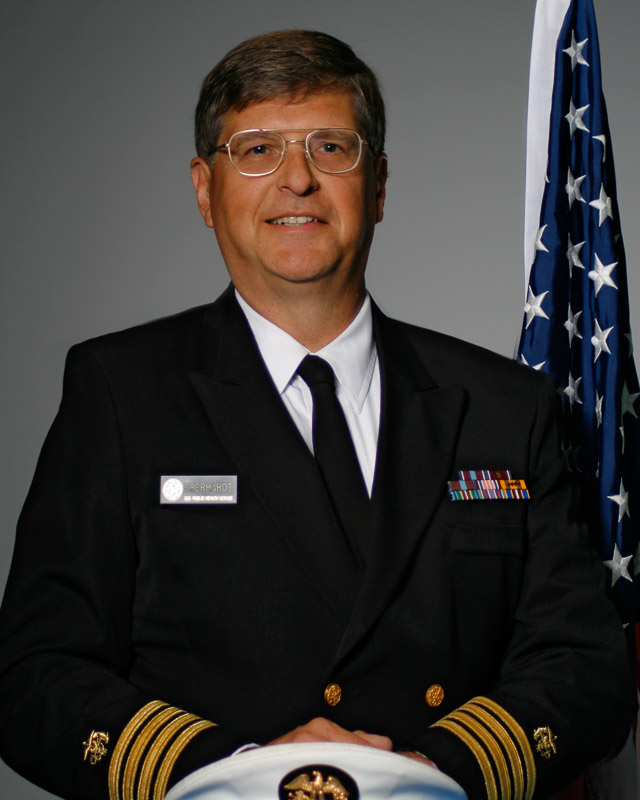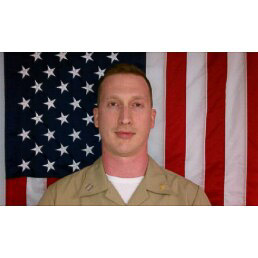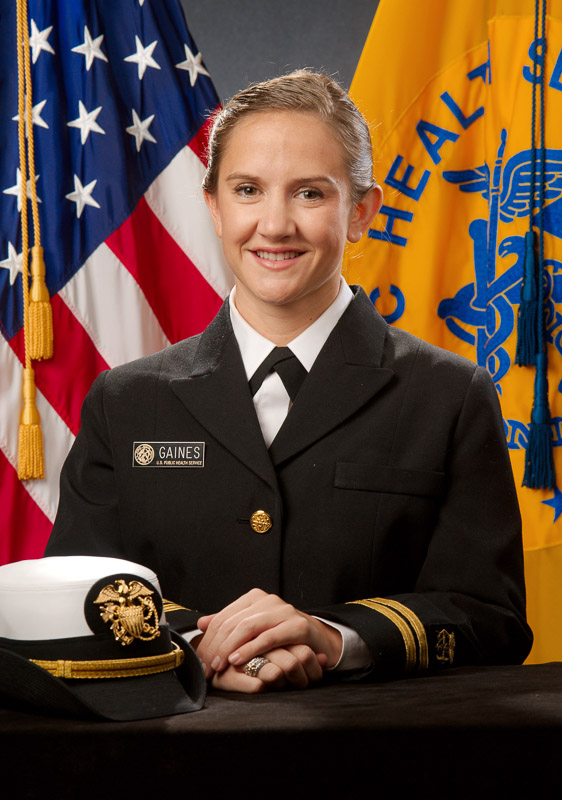2012 Derek Dunn Memorial Senior Scientist Officer of the Year
CAPT Mark S. Eberhardt

CAPT Mark S. Eberhardt is a Senior Scientist in the Division of Health and Nutrition Examination Surveys (DHANES), National Center for Health Statistics (NCHS), Office of Surveillance, Epidemiology, and Laboratory Services, CDC. Currently, he is the Project Officer for the DHANES physical activity monitor component and a subject expert on diabetes and other chronic health conditions. Formerly, he served as the Acting Associate Director for Science in DHANES. In addition, CAPT Eberhardt serves on national steering/interagency committees for diabetes and chronic kidney disease.
CAPT Eberhardt began his professional career as a CDC Epidemic Intelligence Service (EIS) Officer in 1983, assigned to the National Center for Environmental Health in Atlanta, Georgia. While in EIS, he investigated folk remedies used by refugees which contain high levels of heavy metals. The findings were released in a CDC alert and later discussed in JAMA. After completing his 2-year EIS training, he joined CDC’s Diabetes Control Program (DCP) in Atlanta in 1985. During his 3-year tenure in DCP, he worked on programs to reduce the burden on diabetic complications including the establishment of a multi-state system to prevent blindness due to diabetic eye disease. In 1989, he transferred to the Officer of Analysis of Epidemiology, NCHS in Hyattsville, Maryland. He continued his chronic disease research and published one of the earliest papers on national trends in renal conditions in the US. In 2001, he was a co-recipient of the Michaela Modan Memorial Award by the American Diabetes Association for research related to abnormal glucose tolerance and cancer mortality. From 2004-2009, while in the Office of Analysis and Epidemiology at NCHS, he work on numerous chronic disease epidemiology projects including technical support for the National Eye Institute’s National Eye Health Education program which resulted in national surveys regarding knowledge, attitudes and practices for eye health. He has authored/coauthored nearly 75 publications in peer-reviewed journals, book chapters and government reports.
CAPT Eberhardt has numerous Corps awards, and in 2005 he received a leadership award from Vice Admiral Moritsugu for Co-Chairing the Combined Federal Campaign at NCHS. He has mentored many junior officers, scientists, physicians, and interns and has served and the Alternate Chair of CDC’s Commissioned Corps Advisory Board since 2007. CAPT Eberhardt has participated in multiple Corps and Agency deployments, including Hurricane Gustov relief in 2008. He has held adjunct faculty appointments at Emory University, in Atlanta Georgia and the Medical College of South Carolina in Charleston. His undergraduate degree in Genetics is from The Ohio State University in Columbus, Ohio. CAPT Eberhardt received his doctorate in epidemiology from the Graduate School of Public Health, University of Pittsburgh.
In 1999 CAPT Eberhardt had the honor of meeting CAPT Derek Dunn at an annual Commissioned Officer Association meeting. At that meeting, CAPT Dunn’s made a lasting impression when he reminded CAPT Eberhardt that we “must work every day to deserve our stripes.”
2012 Junior Scientist Officer of the Year
LT Seth Green
 LT Seth Green is the Clinical Psychologist for the US Army’s 1st Battalion, 75th Ranger Regiment and 3rd Battalion, 160th Special Operations Aviation Regiment (Airborne); two US Army Special Operations Battalions at the Tip of the Spear in the Global War on Terror. The United States Army Special Operations Command (USASOC) created billets for Corps psychologists to serve with Special Operations Units, and LT Green was the first Corps officer to be selected for a USASOC assignment. He serves as Officer in Charge (OIC) of Behavioral Health for both Battalions at Hunter Army Airfield in Savannah GA. Prior to LT Green’s arrival no behavioral health clinics for these soldiers existed. He provides the full range of psychological services including psychotherapy, assessments, 24 hour on-call crisis intervention and command consultation services. Additionally, he has developed preventative programming (Alcohol Risk Reduction Program) aimed at preventing binge drinking and alcohol related incidents. LT Green served 92 days of TDY with 1/75 Rangers. As a result of LT Green’s leadership and direct actions, consistent lines of communication were opened regarding behavioral health for 1,500 elite soldiers’ thereby improving visibility of acuity of behavioral health needs to battalion commands.
LT Seth Green is the Clinical Psychologist for the US Army’s 1st Battalion, 75th Ranger Regiment and 3rd Battalion, 160th Special Operations Aviation Regiment (Airborne); two US Army Special Operations Battalions at the Tip of the Spear in the Global War on Terror. The United States Army Special Operations Command (USASOC) created billets for Corps psychologists to serve with Special Operations Units, and LT Green was the first Corps officer to be selected for a USASOC assignment. He serves as Officer in Charge (OIC) of Behavioral Health for both Battalions at Hunter Army Airfield in Savannah GA. Prior to LT Green’s arrival no behavioral health clinics for these soldiers existed. He provides the full range of psychological services including psychotherapy, assessments, 24 hour on-call crisis intervention and command consultation services. Additionally, he has developed preventative programming (Alcohol Risk Reduction Program) aimed at preventing binge drinking and alcohol related incidents. LT Green served 92 days of TDY with 1/75 Rangers. As a result of LT Green’s leadership and direct actions, consistent lines of communication were opened regarding behavioral health for 1,500 elite soldiers’ thereby improving visibility of acuity of behavioral health needs to battalion commands.
LT Green joined the Public Health Service as a Clinical Psychology Resident at the DoD with the US Army in Dec 2009. LT Green holds a PhD in Counseling Psychology from Washington State University. LT Green’s doctoral dissertation compared two types of experimental pain (acute vs. chronic) in hypnosis research. He was interested in this topic because he wanted to conduct research with an applied focus on degree of hypnotizability and pain control.
LT Green serves as a member of the SciPAC Visibility Subcommittee, SciPAC Scientist Officer Newsletter Team, and JOAG’s Inter-services Collaboration Committee, and is a member of PsyPAG. LT Green is a COA member and active member in his local chapter.
2012 Scientist Responder of the Year
LT Joanna Gaines
 Dr. Joanna Gaines is a Lieutenant in the US Public Health Service, and an Epidemic Intelligence Service Officer at the Centers for Disease Control and Prevention. She is assigned to the Waterborne Disease Prevention Branch within the Division of Foodborne, Waterborne and Environmental Diseases. LT Gaines provides public health expertise in disease outbreak investigations, improving enteric disease surveillance capacity, and public health preparedness training.
Dr. Joanna Gaines is a Lieutenant in the US Public Health Service, and an Epidemic Intelligence Service Officer at the Centers for Disease Control and Prevention. She is assigned to the Waterborne Disease Prevention Branch within the Division of Foodborne, Waterborne and Environmental Diseases. LT Gaines provides public health expertise in disease outbreak investigations, improving enteric disease surveillance capacity, and public health preparedness training.
While serving as an Epidemic Intelligence Service Officer, LT Gaines has responded to multiple public health emergencies, both domestic and international. In 2010, she was part of the first USPHS/CDC team sent to Haiti in response to the cholera outbreak. LT Gaines served on an interdisciplinary, inter-cultural team to identify risk factors for cholera infection. She then developed a mixed-methods evaluation of epidemic response efforts to identify gaps in control and response efforts. In 2011, LT Gaines deployed to Dadaab Refugee Camp in Kenya to assist the United Nations Refugee Agency (UNHCR) with their surveillance preparedness for cholera and shigella among Somali refugees. She worked directly with partners to establish cholera treatment centers within the refugee camps and improve health agencies’ ability to monitor and detect enteric disease outbreaks. In the US, LT Gaines led a USPHS/CDC team that responded to a nationwide outbreak of Salmonella Typhimurium infections associated with exposure to microbiology laboratories, and collaborated with an interdisciplinary team that included the American Society for Microbiology and the Association of Public Health Laboratories. She also served as the lead investigator for the 2010 outbreak of Salmonella Enteritidis infections associated with shell eggs, considered to be one of the largest outbreaks of its kind in the US. LT Gaines has represented the USPHS as an instructor on foodborne disease outbreak investigation techniques across agencies, including local health departments and the U.S. Air Force. LT Gaines looks forward to continuing to serve as a commissioned officer in the US Public Health Service, protecting, promoting and advancing the health and safety of our nation.
Education: AB (Anthropology) Princeton University; MA (Developmental Psychology), MPH (Health Behaviors), PhD (Developmental Psychology) The University of Alabama at Birmingham.